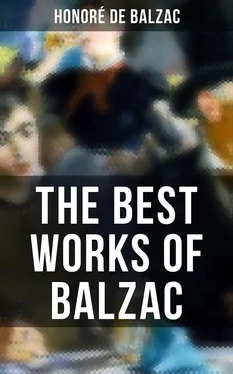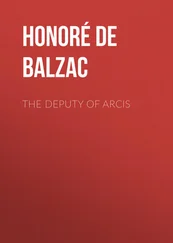“You are not eating your breakfast, wife.”
The poor helot came forward with a piteous look, cut herself a piece of bread, and took a pear. Eugenie boldly offered her father some grapes, saying,—
“Taste my preserves, papa. My cousin, you will eat some, will you not? I went to get these pretty grapes expressly for you.”
“If no one stops them, they will pillage Saumur for you, nephew. When you have finished, we will go into the garden; I have something to tell you which can’t be sweetened.”
Eugenie and her mother cast a look on Charles whose meaning the young man could not mistake.
“What is it you mean, uncle? Since the death of my poor mother”—at these words his voice softened—“no other sorrow can touch me.”
“My nephew, who knows by what afflictions God is pleased to try us?” said his aunt.
“Ta, ta, ta, ta,” said Grandet, “there’s your nonsense beginning. I am sorry to see those white hands of yours, nephew”; and he showed the shoulder-of-mutton fists which Nature had put at the end of his own arms. “There’s a pair of hands made to pick up silver pieces. You’ve been brought up to put your feet in the kid out of which we make the purses we keep our money in. A bad look-out! Very bad!”
“What do you mean, uncle? I’ll be hanged if I understand a single word of what you are saying.”
“Come!” said Grandet.
The miser closed the blade of his knife with a snap, drank the last of his wine, and opened the door.
“My cousin, take courage!”
The tone of the young girl struck terror to Charles’s heart, and he followed his terrible uncle, a prey to disquieting thoughts. Eugenie, her mother, and Nanon went into the kitchen, moved by irresistible curiosity to watch the two actors in the scene which was about to take place in the garden, where at first the uncle walked silently ahead of the nephew. Grandet was not at all troubled at having to tell Charles of the death of his father; but he did feel a sort of compassion in knowing him to be without a penny, and he sought for some phrase or formula by which to soften the communication of that cruel truth. “You have lost your father,” seemed to him a mere nothing to say; fathers die before their children. But “you are absolutely without means,”—all the misfortunes of life were summed up in those words! Grandet walked round the garden three times, the gravel crunching under his heavy step.
In the crucial moments of life our minds fasten upon the locality where joys or sorrows overwhelm us. Charles noticed with minute attention the box-borders of the little garden, the yellow leaves as they fluttered down, the dilapidated walls, the gnarled fruit-trees,—picturesque details which were destined to remain forever in his memory, blending eternally, by the mnemonics that belong exclusively to the passions, with the recollections of this solemn hour.
“It is very fine weather, very warm,” said Grandet, drawing a long breath.
“Yes, uncle; but why—”
“Well, my lad,” answered his uncle, “I have some bad news to give you. Your father is ill—”
“Then why am I here?” said Charles. “Nanon,” he cried, “order post-horses! I can get a carriage somewhere?” he added, turning to his uncle, who stood motionless.
“Horses and carriages are useless,” answered Grandet, looking at Charles, who remained silent, his eyes growing fixed. “Yes, my poor boy, you guess the truth,—he is dead. But that’s nothing; there is something worse: he blew out his brains.”
“My father!”
“Yes, but that’s not the worst; the newspapers are all talking about it. Here, read that.”
Grandet, who had borrowed the fatal article from Cruchot, thrust the paper under his nephew’s eyes. The poor young man, still a child, still at an age when feelings wear no mask, burst into tears.
“That’s good!” thought Grandet; “his eyes frightened me. He’ll be all right if he weeps,—That is not the worst, my poor nephew,” he said aloud, not noticing whether Charles heard him, “that is nothing; you will get over it: but—”
“Never, never! My father! Oh, my father!”
“He has ruined you, you haven’t a penny.”
“What does that matter? My father! Where is my father?”
His sobs resounded horribly against those dreary walls and reverberated in the echoes. The three women, filled with pity, wept also; for tears are often as contagious as laughter. Charles, without listening further to his uncle, ran through the court and up the staircase to his chamber, where he threw himself across the bed and hid his face in the sheets, to weep in peace for his lost parents.
“The first burst must have its way,” said Grandet, entering the living-room, where Eugenie and her mother had hastily resumed their seats and were sewing with trembling hands, after wiping their eyes. “But that young man is good for nothing; his head is more taken up with the dead than with his money.”
Eugenie shuddered as she heard her father’s comment on the most sacred of all griefs. From that moment she began to judge him. Charles’s sobs, though muffled, still sounded through the sepulchral house; and his deep groans, which seemed to come from the earth beneath, only ceased towards evening, after growing gradually feebler.
“Poor young man!” said Madame Grandet.
Fatal exclamation! Pere Grandet looked at his wife, at Eugenie, and at the sugar-bowl. He recollected the extraordinary breakfast prepared for the unfortunate youth, and he took a position in the middle of the room.
“Listen to me,” he said, with his usual composure. “I hope that you will not continue this extravagance, Madame Grandet. I don’t give you MY money to stuff that young fellow with sugar.”
“My mother had nothing to do with it,” said Eugenie; “it was I who—”
“Is it because you are of age,” said Grandet, interrupting his daughter, “that you choose to contradict me? Remember, Eugenie—”
“Father, the son of your brother ought to receive from us—”
“Ta, ta, ta, ta!” exclaimed the cooper on four chromatic tones; “the son of my brother this, my nephew that! Charles is nothing at all to us; he hasn’t a farthing, his father has failed; and when this dandy has cried his fill, off he goes from here. I won’t have him revolutionize my household.”
“What is ‘failing,’ father?” asked Eugenie.
“To fail,” answered her father, “is to commit the most dishonorable action that can disgrace a man.”
“It must be a great sin,” said Madame Grandet, “and our brother may be damned.”
“There, there, don’t begin with your litanies!” said Grandet, shrugging his shoulders. “To fail, Eugenie,” he resumed, “is to commit a theft which the law, unfortunately, takes under its protection. People have given their property to Guillaume Grandet trusting to his reputation for honor and integrity; he has made away with it all, and left them nothing but their eyes to weep with. A highway robber is better than a bankrupt: the one attacks you and you can defend yourself, he risks his own life; but the other—in short, Charles is dishonored.”
The words rang in the poor girl’s heart and weighed it down with their heavy meaning. Upright and delicate as a flower born in the depths of a forest, she knew nothing of the world’s maxims, of its deceitful arguments and specious sophisms; she therefore believed the atrocious explanation which her father gave her designedly, concealing the distinction which exists between an involuntary failure and an intentional one.
“Father, could you not have prevented such a misfortune?”
“My brother did not consult me. Besides, he owes four millions.”
“What is a ‘million,’ father?” she asked, with the simplicity of a child which thinks it can find out at once all that it wants to know.
Читать дальше












